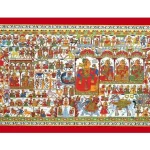An unusual, thought-provoking book, ‘No One is Talking About This’ was reviewed at our book club recently. It brought to the forefront the juxtaposition of the older generation and their ‘normal’ and today’s generation surrounded by gadgets which replace humans. Or do they?
Vidur Bhatia, lawyer, critiques the book:

Short-listed for the Booker Prize and the Women’s Prize, “No One is Talking About This” written by Patricia Lockwood, an American author, is contemporary and written in an unusual style. The book is divided into two parts: the first part describing a woman who spends a lot of time on the world wide web (the “portal” as the book calls it) and the second, by contrast, concerning the period when her baby niece has a life-threatening condition.
Part I of the book is not easily comprehensible with its short paragraphs, perhaps depicting the short-attention span of today’s generation. On reading the first part, you get a sense that the author is attempting a commentary (at times satirical) on society today through the main character, the most notable aspect of which is the addiction to the internet, social media, fake news and a life far removed from the ‘real’. The book is also replete with political overtones, seemingly set when Donald Trump is President of the United States (with references to him as ‘dictator’), as well as references to political correctness in present times (“Increasingly we were worried about the new sense of humour”). Other themes explored include privacy or the lack thereof (“The amount of eavesdropping that was going on was enormous, and the implications not yet known”), the ‘Me Too’ movement; the latter by referring to the iconic photograph of a woman being bent backwards and kissed by a soldier on V-Day. The book reads “We had seen it all our lives, and thought we understood the particular firework it captured – and now the woman has risen from history to tell everyone that she didn’t know the man at all, that in fact she had been frightened throughout the whole encounter”. There is also a not-so-subtle reference to President George W. Bush Senior in this context.
The portal becomes an avenue for people to become famous as the book notes that as long as the protagonist reads the news, she had some say in what happened. The element of voyeurism is also highlighted with a fascination of those on the portal to see the gory details of crimes and the live suicide of the war criminal Slobodan Praljak after he was sentenced at the Hague.The book touches on racism and how white people were suddenly feeling ‘compelled’ to speak out about injustice. The notorious ‘gun culture’ of the United States is highlighted with reference to the Breivik massacre in Norway in 2011 with the main character, while in Norway, wondering how strange it was ‘to live in a country where someone can say “the massacre” and you don’t have to ask which one’.
The reference to globalisation is evident with the main character recognising the smell of Subway bread while in Europe. Capitalism is also raised when the protagonist believes that rich people thought they worked harder because they identified with the pile of money itself. The ‘generation gap’ is highlighted when the author refers to wrong emojis being used by older people and the language used in text messages. The author also touches on climate change, the use of Bitcoin, the fleeting nature of online relationships, how “every man on the planet was about to burst from a supplement sold to him by another man” and how the golden air of air travel entered its twilight.
The protagonist’s family is also introduced during Part One; we learn of her husband, parents, sister and brother. The crux of Part I is the futility of what we have become – this is captured early on when the lead character opens the portal and people were asking each other, “Are we all just going to keep doing this till we die?” (yet they continue to do so), when her husband asks her “What are you doing?” and when she asks why she had elected to live so completely in the portal.
The main character is startled from her online persona when she receives messages when she is in Vienna asking her how soon she can get home. Her sister’s foetus shows the baby has a rare condition affecting one in a billion. Her father, in particular, will not permit an abortion (another contentious issue) so the baby is born with serious health problems. What follows is in complete contrast with Part I– we find a human connection, a real relationship replacing the virtual ones. As the baby’s godmother, the protagonist wishes to spend as much time with her as possible. The baby gives her something the portal cannot. Indeed, on the odd occasion the protagonist enters the portal in Part II, she acknowledges that it is different to before.
The book challenges the way we are living our lives, and talks about the things which we know and feel but which are not said aloud and of which no one is talking about. The protagonist is conflicted; immersed in the portal while, at some level, realising the futility of it. No One is Talking About This reminds us that however technologically advanced we may become as a race, nothing can beat a human connection.
Nalini Deka, Professor of Psychology, Cognitive Developmental and Clinical Psychologist, based in New Delhi, asks the following questions of the book:
- Why do people withdraw to a state of being everywhere yet nowhere?
- Is withdrawing into cyber space so common in today’s generation, all over the world? What kind of an escape mechanism is this?
- Why are most discussions on the web about inane issues rather than real world issues? Why do we create them for others who are equally addicted to surfing? (For example, the book’s reference to ‘Can a dog be twins?’)This inanity leads the protagonist to create an ‘airy’ persona so that she can become a member of the portal. Outrageous / outlandish usernames like ‘Shit Head’ or ‘Black Tiger’ are common.
- Why does she want to give up the real to live in the unreal world of web stories and events?
- How does the portal become a source of security for her?
- Is she dependent on psychotropic drugs or to weed and Hashish?
If this has aroused your interest to read the book, given us your comments.




